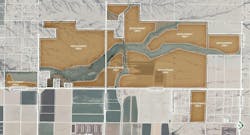Scaling Up: Tract’s Master-Planned Land and Infrastructure Approach to Data Center Development
Key Highlights
- Tract controls over 25,000 acres of potential sites and plans to support over 25 GW of workload capacity, focusing on high-growth regions for data center development.
- The Buckeye project in Arizona is one of the largest land deals in the U.S., supporting up to 20 million sq ft of data center space with nearly $20 billion investment planned.
- Caldwell County, Texas, offers a strategic location between Austin and San Antonio, with over 2 GW of capacity planned and infrastructure support from Bluebonnet Electric Cooperative.
- The Mooresville Tech Park in North Carolina is a 400-acre campus expected to support 1.5 million sq ft of data centers, with initial power delivery anticipated in 2029.
- Tract’s integrated approach includes pre-building energy, cooling, and transportation infrastructure, reducing deployment time and increasing project certainty for hyperscale clients.
With the rapid growth of physical data center infrastructure, it’s no surprise that a niche market has emerged for companies specializing in land acquisition. Reports of massive property purchases by firms planning new facilities appear almost daily—and so do accounts of the challenges developers face before the first shovel hits the ground. As parcel sizes grow and power and water demands intensify, the complexities of acquiring and preparing these sites have only increased.
Tract is a leader in this space. The Denver-based company develops master-planned data center parks, with more than 25,000 acres of potential sites under its control and plans to support over 25 GW of workload capacity. To put that into perspective, 25,000 acres is roughly 40 square miles—about two-thirds the land area of Washington, D.C., or, for European readers, two-thirds the size of Liechtenstein.
Building Shovel-Ready Megasites
Rather than waiting for developers to come knocking, Tract takes a proactive approach, built on the core belief that the future of data center growth lies in pre-entitled, zoned, and infrastructure-ready megasites. The company works years in advance to deliver shovel-ready campuses with reliable energy, fiber connectivity, and municipal cooperation already in place.
Its model emphasizes strategic land aggregation in high-growth regions, the cultivation of long-term relationships with utilities and governments, and master planning for power, cooling, transportation, and sustainability. This integrated approach positions Tract to deliver both speed and certainty to hyperscale project developers—at scale.
Tract’s leadership team brings deep industry experience. Founder and Executive Chairman Grant van Rooyen previously led acquisitions and expansions at Cologix and Teraco. President Matt Spencer brings more than 35 years of telecom and infrastructure leadership, while Chief Energy Officer Nat Sahlstrom, former head of Amazon’s global energy, water, and sustainability teams, helped make Amazon the world’s largest buyer of renewable energy. Backed by major institutional investors—including Berkshire Partners, PSP Partners, Permira, S2G Ventures, and Columbia Capital—Tract is well positioned to capitalize on the industry’s rapid growth.
Significant Projects Underway
In January, DCF reported on the launch of Tract Fleet Data Centers, a platform designed to deliver build-to-suit, multi-hundred-megawatt campuses for hyperscale clients. Tract sees this as the next evolution of hyperscale outsourcing—where the developer not only secures the land but also pre-builds the energy and cooling infrastructure before the cloud provider ever steps on site.
With zoning, utility infrastructure, and power availability in place from day one, Tract believes it has found a winning formula to attract next-generation hyperscale development.
Buckeye, Arizona: One of the Nation’s Largest Data Center Land Deals
In August 2024, Tract closed on a 2,069-acre property in Buckeye, Arizona—one of the largest single data center land acquisitions in the United States. The master plan calls for up to 20 million square feet of data center space across 40 facilities. The site comprises 22 parcels, ranging from 40 to 242 acres each, all with existing by-right permissions for data center use.
The project is envisioned as a multi-phase buildout over as many as 15 years, supporting nearly 2,000 construction jobs at peak activity. Tract is collaborating with local utilities to deliver 1.8 GW of power infrastructure to the site.
The location sits near the Palo Verde Generating Station, the largest nuclear power plant in the United States by net generation. Its three 1,400 MWe units have been in operation since 1986. Plant operator Arizona Public Service has received a 20-year license extension for each unit—through 2045 for Unit 1, 2046 for Unit 2, and 2047 for Unit 3—and has the option to seek further extensions to extend operations beyond those dates.
Local media has reported that total investment in the Buckeye data center sites could reach $20 billion. In August 2024, the Buckeye City Council approved a development agreement with Tract that would reimburse the company up to $50 million once the project generates $60 million in revenue for the city.
Buckeye Mayor Eric Osborn was quoted as saying:
If this goes the way I really hope it does, this I think is a game changer. This would be the largest data center complex in the Western United States, rivaling some of the complexes that are in the Virginia area that are economic engines.
Caldwell County, Texas: Strategic Site Between Austin and San Antonio
In May 2025, Tract announced its acquisition of a 1,515-acre property in Caldwell County, Texas, strategically located between Austin and San Antonio. The site, which underwent an 18-month entitlement and planning process, is designed to support more than 2 GW of data center capacity at full build-out.
An initial 360 MW of power is expected to be available in early 2028 through an agreement with Bluebonnet Electric Cooperative, one of the oldest such cooperatives in Texas. The six designated sites on the property are also being provisioned for on-site power generation. The development sits along the Kinder Morgan Permian Highway gas pipeline, making LNG use a straightforward option—a significant advantage for supplemental and backup power generation.
Texas Governor Greg Abbott sounds like a booster of the project, saying:
Texas is where the future of innovation is building, including in advanced technologies. This new data center development in San Marcos will create good-paying jobs, bolster the state’s power grid, and enhance our technology infrastructure. We look forward to working with corporate partners like Tract to further expand Texas’ economic might and develop our state as the epicenter of technological advancement.
County Judge Hoppy Haden praised Tract’s willingness to understand and address the needs of local communities affected by large-scale development projects. He highlighted specific infrastructure priorities for the county and noted Tract’s readiness to tackle them, saying:
Tract has leaned in to understand Caldwell County’s needs as we welcome a wave of new residents and businesses. Transportation is a key priority for our residents, and Tract’s willingness to invest alongside the County and State into an expansion of FM 2720, a key new transportation project, shows they are invested in the future of Caldwell County.
In addition to the projects already mentioned, Tract has eight more developments underway. These include:
-
One additional site in Arizona.
-
Four sites in Nevada, including the company’s largest land acquisition to date—8,590 acres in Virginia City Highlands.
-
Two sites in Texas.
-
Two sites in Utah, including its smallest property, the 225-acre Pony Express site.
-
One site in Virginia.
Tract also has projects in process in Minnesota, Iowa, Illinois, and North Carolina.
Mooresville Technology Park: North Carolina Campus in Planning
Most recently, Tract is planning a 400-acre master-planned data center campus in Mooresville, Iredell County, roughly 30 miles north of Charlotte. As noted in reporting by Dan Swinhoe of Data Center Dynamics, the site, currently zoned Residential Agricultural (RA), could support up to five data center buildings totaling 1.5 million square feet at full build-out.
Construction on the first facilities is expected to begin in 2028, with initial power delivery projected for 2029. Duke Energy will provide electricity via existing transmission lines capable of supporting high-tech operations. Tract estimates that more than $30 billion could be invested in the site over the next two decades.
The land is owned by Teresa Earnhardt, widow of NASCAR legend Dale Earnhardt, through Earnhardt Farms LLC. The project has drawn controversy both within the Earnhardt family and among local residents, some of whom oppose rezoning for industrial use. Nearly 200 residents have attended public meetings to voice concerns, and advocacy groups—including NoDataCenterMooresvilleNC.com—have formed to challenge the development.
Tract emphasizes that the Mooresville Technology Park will be a thoughtfully planned campus, aiming to maximize economic benefits for the community while minimizing impact. The company’s approach mirrors its other master-planned sites across Nevada, Texas, Virginia, Arizona, Minnesota, and Utah, developed under its Fleet DC platform.
About the Author

David Chernicoff
Matt Vincent
Matt Vincent is Editor in Chief of Data Center Frontier, where he leads editorial strategy and coverage focused on the infrastructure powering cloud computing, artificial intelligence, and the digital economy. A veteran B2B technology journalist with more than two decades of experience, Vincent specializes in the intersection of data centers, power, cooling, and emerging AI-era infrastructure. Since assuming the EIC role in 2023, he has helped guide Data Center Frontier’s coverage of the industry’s transition into the gigawatt-scale AI era, with a focus on hyperscale development, behind-the-meter power strategies, liquid cooling architectures, and the evolving energy demands of high-density compute, while working closely with the Digital Infrastructure Group at Endeavor Business Media to expand the brand’s analytical and multimedia footprint. Vincent also hosts The Data Center Frontier Show podcast, where he interviews industry leaders across hyperscale, colocation, utilities, and the data center supply chain to examine the technologies and business models reshaping digital infrastructure. Since its inception he serves as Head of Content for the Data Center Frontier Trends Summit. Before becoming Editor in Chief, he served in multiple senior editorial roles across Endeavor Business Media’s digital infrastructure portfolio, with coverage spanning data centers and hyperscale infrastructure, structured cabling and networking, telecom and datacom, IP physical security, and wireless and Pro AV markets. He began his career in 2005 within PennWell’s Advanced Technology Division and later held senior editorial positions supporting brands such as Cabling Installation & Maintenance, Lightwave Online, Broadband Technology Report, and Smart Buildings Technology. Vincent is a frequent moderator, interviewer, and keynote speaker at industry events including the HPC Forum, where he delivers forward-looking analysis on how AI and high-performance computing are reshaping digital infrastructure. He graduated with honors from Indiana University Bloomington with a B.A. in English Literature and Creative Writing and lives in southern New Hampshire with his family, remaining an active musician in his spare time.



